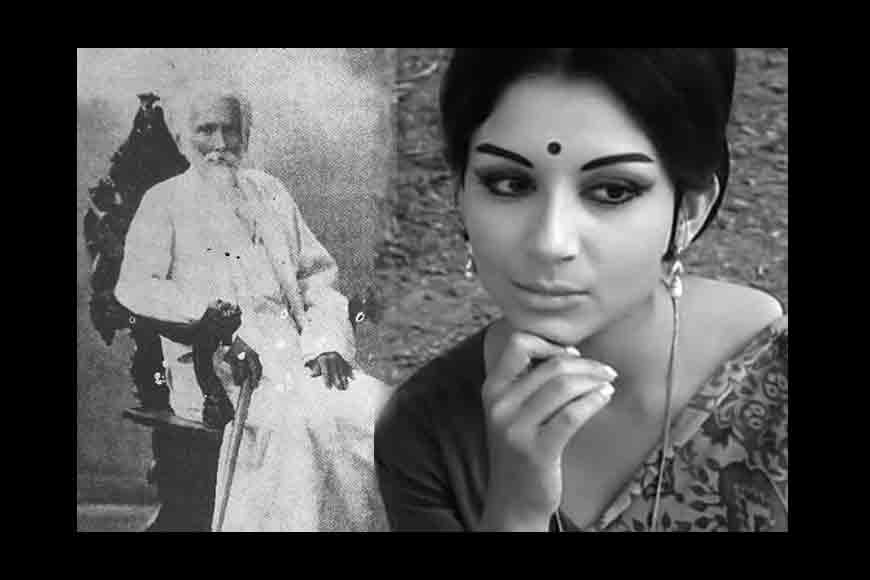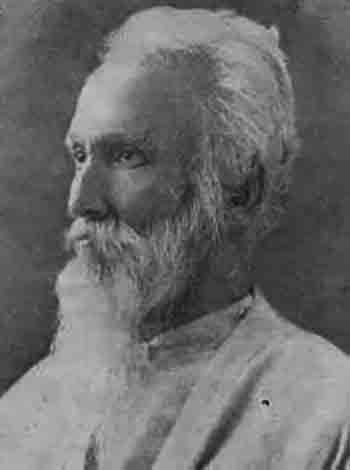Sharmila's ancestor praised by poet Madhusudan?

 His youngest brother, Rabindranath Tagore was not born then. Yet, Dwinjendranath Tagore had successfully completed and published poetry books and even experimented with Bengali shorthand and various poetic styles. Dwijendranath was the eldest son of Debendranath Tagore of Jorasanko and was one of the pioneers in Bengal short-hand and typing. His success story is etched even before his younger brother Rabindranath was born, but very few of us know about him. He was close to his next brother Satyendranath Tagore, but the two brothers differed considerably. While Dwijendranath was comfortable with traditions in society, Satyendranath enjoyed breaking down conservative rules and developing a modern society.
His youngest brother, Rabindranath Tagore was not born then. Yet, Dwinjendranath Tagore had successfully completed and published poetry books and even experimented with Bengali shorthand and various poetic styles. Dwijendranath was the eldest son of Debendranath Tagore of Jorasanko and was one of the pioneers in Bengal short-hand and typing. His success story is etched even before his younger brother Rabindranath was born, but very few of us know about him. He was close to his next brother Satyendranath Tagore, but the two brothers differed considerably. While Dwijendranath was comfortable with traditions in society, Satyendranath enjoyed breaking down conservative rules and developing a modern society.
Dwijendranath however loved experimenting. After his wife’s death at an early age, he remained a widower all his life. He also had a tremendous contribution to Bengali literature and translated Kalidasa’s classical Sanskrit work Meghdootin 1860. Dwijendranath was only twenty years old then. It was the first time that the great Sanskrit poet’s work was translated into Bengali. He had used two different Bengali rhythmic styles for this translation.
His second work of poetry was Swapnaprayan, published in 1875. Rabindranath Tagore was then an adolescent. This poem describes the travels of a young man to different places. He had displayed a remarkable control over the use of different rhythmic styles in the book. The book is of historic value and was a trendsetter. It was during this time that Michael Madhusudan Dutta was already at the height of his success. He produced plays and poems such as Tilottama (1859), Padmavati (1860), Meghnadbadh Kavya (1861), Vrajangana (1861), Krishnakumari (1861), Virangana (1862), and so on. Each of his poems and sonnets had a scintillating grace that was unknown in Bengali literature. Michael Madhusudan had hailed Dwijendranath as a poet of the future in whose honour he could dip his hat in respect.
Dwijendranath was a highly talented poet but a disorganised person. Rabindranath said that so many pages of Swapnaprayan used to float around Jorasanko Thakur Bari and if they could be collected and published it would have been a valuable volume. His philosophical work, Tattwabidya (‘Knowledge of Principles’), published in three volumes between 1866 and 1868, was a pioneering effort in Bengali. Never before, had such a work been published in that language. He also edited Tattwabodhini Patrika for 25 years from 1884 and was founder of Hitabadi. He was even elected president of Bangiya Sahitya Parishad from 1897 to 1900. Dwijendranath loved experimenting. He was a pioneer in the field of Bengali shorthand and even coded it in the form of poetry, using notations (swaralipi) for Bengali music. The only other person who could claim credit for it was Kshetra Mohan Goswami, assistant to Raja Shourindramohan Tagore. In 1913, he wrote a book Boxometry about construction of boxes. He was adept in folding paper into different shapes. Dwijendranath is ancestor of actress Sharmila Tagore. One of Dwijendranath’s granddaughters, Latika, is the maternal grandmother of Sharmila.
(References: Bandopadhyay, Hiranmay, Thakurbarir Katha, (in Bengali), pp. 95–8, Sishu Sahitya Samsad.
Devi Choudhurani, Indira, Smritisamput, (in Bengali), Rabindrabhaban, Viswabharati, pp. 29–31)










